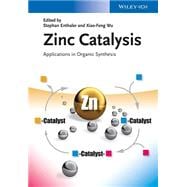
Note: Supplemental materials are not guaranteed with Rental or Used book purchases.
Purchase Benefits
What is included with this book?
List of Contributors XI
1 Introduction: Zinc Catalysts for Organic Transformations 1
Stephan Enthaler and Xiao-Feng Wu
References 3
2 Zinc-Catalyzed Reductions of Unsaturated Compounds 5
Yuehui Li, Kathrin Junge, and Matthias Beller
2.1 Introduction 5
2.2 Hydrosilylation of Unsaturated Compounds 5
2.2.1 Nonchiral Hydrosilylation of Carbonyl Bonds 6
2.2.2 Asymmetric Hydrosilylation of C=O Bonds 14
2.2.3 Zinc-Catalyzed Hydrosilylation of C=N and Other Multiple Bonds 19
2.3 Hydrogenation 25
2.4 Transfer Hydrogenation of Unsaturated Compounds 28
2.5 Concluding Remarks 29
References 29
3 Zinc-Catalyzed Oxidation Reactions 33
Liang-Qiu Lu and Xiao-Feng Wu
3.1 Introduction 33
3.2 Oxidative Transformation of Alkenes 34
3.3 Oxidative Transformation of Aldehydes 38
3.4 Oxidative Transformation of C–X Bonds (X=O, N, and S) 42
3.5 Oxidative Functionalization of sp3 C–H Bonds 49
3.6 Other Oxidative Reactions with Redox-Active Ligands 50
3.7 Summary and Outlook 53
References 53
4 Zinc-Catalyzed Friedel–Crafts Reactions 57
Yonghai Hui, Lili Lin, Xiaohua Liu, and Xiaoming Feng
4.1 Introduction 57
4.2 Friedel–Crafts Acylation 58
4.3 Friedel–Crafts Alkylations 59
4.3.1 Racemic Friedel–Crafts Alkylation 60
4.3.2 Asymmetric Friedel–Crafts Alkylations 64
4.4 Conclusions 80
References 80
5 Zinc-Catalyzed Hydroamination Reactions 83
Tianshu Li, Jelena Wiecko, and Peter W. Roesky
5.1 Introduction 83
5.2 Inorganic Zinc Salts as Catalysts 85
5.3 Aminotroponiminate Zinc Complexes as Catalysts 93
5.3.1 Aminotroponiminate Zinc Complex as a Hydroamination Catalyst 93
5.3.2 Modifications of Aminotroponiminate Zinc Complexes 95
5.3.3 Aminotroponiminate Zinc Complex Immobilized on Mesoporous Silica 101
5.4 Other Zinc Organometallic Compounds as Catalysts 104
5.4.1 Other Zn–N Complexes 104
5.4.2 ZnEt2, [Cp∗2 Zn2], and [Cp∗2Zn] as Hydroamination Precatalysts 110
5.5 Double Metal Cyanide Catalysts 114
5.6 Summary 115
References 115
6 Zinc-Catalyzed C–C Bond Formation 119
Rubén Vicente
6.1 Introduction 119
6.2 Zinc-Catalyzed Aldol-Type Reactions 120
6.2.1 Zinc-Catalyzed Aldol and Mukaiyama-Aldol Reactions 120
6.2.2 Zinc-Catalyzed Michael Addition Reactions 123
6.2.3 Zinc-Catalyzed Henry and Aza-Henry Reactions 126
6.2.4 Zinc-Catalyzed Mannich-Type Reactions 127
6.3 Zinc-Catalyzed Cycloaddition Reactions 127
6.4 Zinc-Catalyzed Addition of Organometallic Reagents to Carbonyl and Related Compounds 129
6.4.1 Alkylation Reactions with Grignard Reagents 129
6.4.2 Allylation, Propargylation, and Allenylation Reactions with Organometallic Reagents 130
6.4.3 Catalytic Acetylide Addition Reactions 132
6.5 Zinc-Catalyzed Cross-Coupling Reactions 133
6.6 Radical Reactions Involving Catalytic Amounts of Zinc 134
6.7 Zinc-Catalyzed Reactions through Alkyne Activation 135
6.8 Zinc-Catalyzed Cyclopropanation Reactions 139
6.9 Other Zinc-Catalyzed Reactions 141
6.10 Summary and Outlook 142
References 143
7 Zinc-Catalyzed C–N and C–O Bond Formation Reactions 149
Luis A. López and Jesús González
7.1 Introduction 149
7.2 Zinc-Catalyzed C–N Bond Formation Reactions 150
7.2.1 Zinc-Catalyzed Hydroamination Reactions and Related Processes 150
7.2.2 Zinc-Catalyzed Reactions of Carbonyl Compounds or Carboxylic Acid Derivatives with Amines and Related Compounds 156
7.2.3 Zinc-Catalyzed Reactions Involving Azides and Diazocompounds 159
7.2.4 Zinc-Catalyzed -N-Functionalization of C-H Bonds 162
7.2.5 Zinc-Catalyzed C–N Bond-Forming Reactions Involving the Cleavage of Cyclopropanes and Epoxides 163
7.3 Zinc-Catalyzed C–O Bond Formation Reactions 164
7.3.1 Zinc-Catalyzed C–O Bond Formation Involving Intramolecular Cyclization 164
7.3.2 Zinc-Catalyzed Transesterifications and Amide Cleavages 167
7.3.3 Zinc-Catalyzed Michael Addition/Cyclization Sequence 171
7.3.4 Zinc-Catalyzed Hetero-Diels–Alder Reactions of Aldehydes and Functionalized Dienes 171
7.3.5 Zinc-Catalyzed Multicomponent Reactions 172
7.4 Summary and Conclusion 174
References 175
8 Zinc-Catalyzed Transformation of Carbon Dioxide 179
Stefan Kissling, Peter T. Altenbuchner, Teemu Niemi, Timo Repo, and Bernhard Rieger
8.1 Introduction 179
8.2 Zinc Catalysts for the Copolymerization of Epoxides and CO2 181
8.2.1 Mechanistic Aspects of CO2/Epoxide Copolymerization 181
8.2.2 Heterogeneous Catalysts 182
8.2.3 Homogeneous Catalysts 185
8.2.4 Functional Polycarbonates 194
8.3 Zinc-Catalyzed Synthesis of Cyclic Carbonates Utilizing Carbon Dioxide as a Chemical Feedstock 196
8.3.1 Cyclic Carbonates from Cycloaddition of CO2 to Epoxides 196
8.3.2 Cyclization of Carbon Dioxide and Diols 200
8.4 Summary 201
References 202
9 Zinc-Catalyzed Depolymerization Reactions 207
Stephan Enthaler
9.1 Introduction 207
9.2 Zinc-Catalyzed Depolymerization of Polyethers 208
9.3 Zinc-Catalyzed Depolymerization of Polyesters 212
9.4 Zinc-Catalyzed Depolymerization of Silicones 214
9.5 Summary 215
References 215
10 Applications of Zinc-Promoted Reaction in Total Synthesis 219
Hui Liu and Xuefeng Jiang
10.1 Introduction 219
10.2 Zinc-Promoted Reactions without Ligands 219
10.2.1 Zinc-Catalyzed Reactions 219
10.2.2 Zinc-Mediated Reactions 224
10.3 Zinc-Mediated Reactions with Ligands 243
10.3.1 Zinc-Catalyzed Reactions 243
10.3.2 Zinc-Mediated Reactions 252
10.4 Other Zinc-Promoted Reactions 262
References 271
11 Application of Organozinc Reagents in Oxidative Coupling Reactions 275
Aiwen Lei, Zhiliang Huang, and Dong Liu
11.1 Introduction 275
11.1.1 Oxidative Coupling 276
11.1.2 Organozinc Reagents 277
11.1.3 Preparation of Organozinc Reagents 277
11.1.4 Organozinc Halides 280
11.2 Oxidative Coupling between Zinc Reagents and C(sp) Nucleophiles 283
11.3 Oxidative Coupling between Organozinc Reagents and C(sp2) Nucleophiles 287
11.3.1 C(sp2)-M Compounds as Nucleophiles 287
11.3.2 C(sp2)-H Compounds as Nucleophiles 289
11.4 Oxidative Coupling between Organozinc Reagents and C(sp3) Nucleophiles 292
11.4.1 Oxidative Coupling between Organozinc Reagents and C(sp3)-Organometallic Reagents 292
11.4.2 Oxidative Coupling between Organozinc Reagents and C(sp3)-H Compounds 295
11.5 Oxidative Coupling between Organozinc Reagents and Heteroatom Nucleophiles 296
11.5.1 C–N Bond Formation 296
11.5.2 C–O Bond Formation 298
11.6 Conclusion 299
References 299
Index 303
The New copy of this book will include any supplemental materials advertised. Please check the title of the book to determine if it should include any access cards, study guides, lab manuals, CDs, etc.
The Used, Rental and eBook copies of this book are not guaranteed to include any supplemental materials. Typically, only the book itself is included. This is true even if the title states it includes any access cards, study guides, lab manuals, CDs, etc.